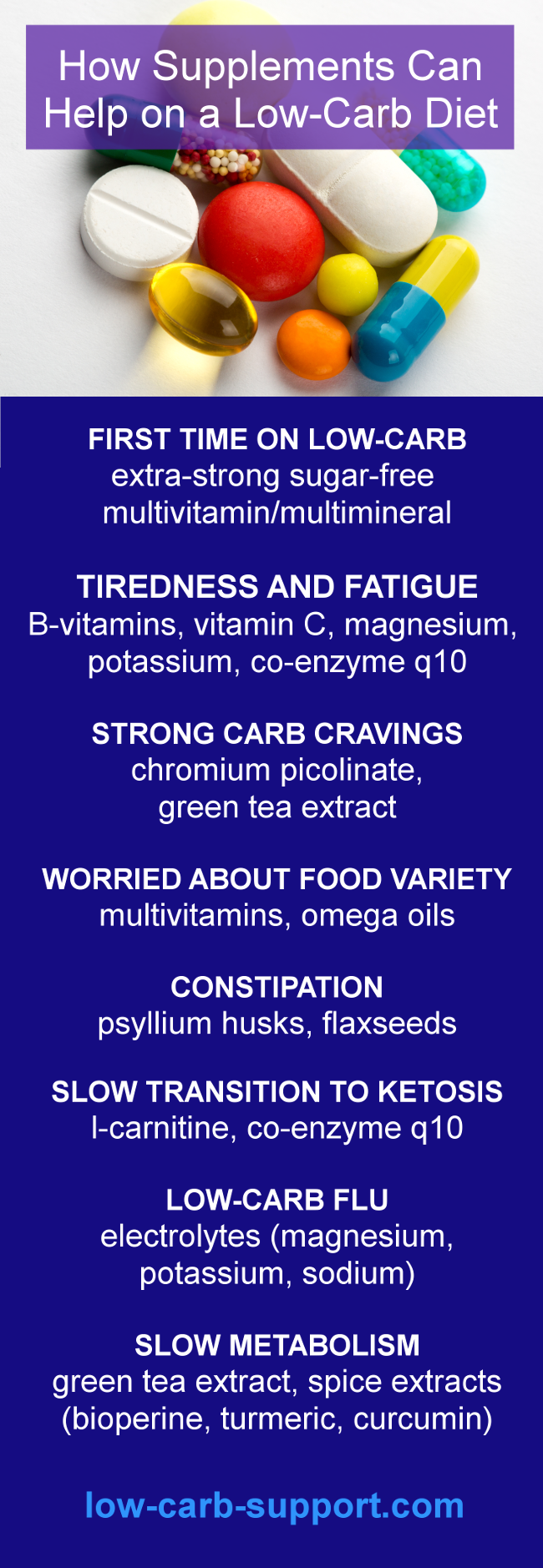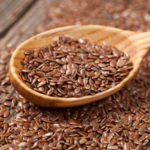
Do you need nutritional supplements on a low-carb diet? Can they really make your weight loss easier and healthier? Or perhaps it’s all just hype, designed to make you spend megabucks on useless products.
There is no single definitive answer. There is a fair chance supplements could work for you. Millions of people get real results and tangible benefits from nutritional supplements.
But then again, maybe not. Just because a certain supplement worked for others, there is no guarantee that it will also work for you. We are all different. There is no “magic bullet” that works for everyone.
Why we all have different supplement needs
Your supplement needs depend on your diet, lifestyle, genetics, body composition and many other individual factors. Some of us don’t need any supplements at all.
There are a few guidelines on how to support your low-carb diet with supplements. But again, they can vary depending on whether your low-carb diet is ketogenic, how much fresh food you get, how much exercise you do, etc.
Generally, you are likely to need more supplement support in the beginning of your low-carb diet, to help you adapt. Supplements can also help with common low-carb diet problems, for example, tiredness or sugar cravings.
Before you open your wallet, take a few moments to consider whether YOU need supplements, and if yes, which ones.
This article guides you through a few simple questions to help you decide.
Checklist: Do you need low-carb diet supplements?
If you answer yes to any of the questions below, click on the link to see the list of supplements that may help.
Have you just started – or about to start – a low-carb diet for the first time?
Do you feel tired all the time?
Do you have strong cravings for carbs?
Do you worry that your nutrition is not as varied as it should be?
Does your diet lack essential omega oils (fatty fish, seeds, oils)?
Do you keep getting constipated?
Are you struggling to break into ketosis?
If you are just starting a low-carb diet for the first time
Switching to a low-carb diet is a major change for your body, especially on ketogenic diets like Keto or Atkins Induction.
Your entire metabolism must reset before switching to fat as the main energy source. Nutritional profile of your food changes dramatically. You cut out certain high-vitamins foods like fruit and grains.
Of course, there are still plenty of vitamins in low-carb foods like red meat, leafy vegetables and healthy fats. But their make-up is different.
Most low-carb diet plans recommend taking a multivitamin during this initial transition. Dr Atkins stipulated supplements as a requirement for Atkins Induction. Multivitamins protect you against nutritional deficiencies, and help your body get through the stress of the transition period.
Get enough supply for at least one month to start with. Once you become fully keto-adapted, you could stop the multivitamin – provided your food includes plenty of vitamin-rich low-carb foods, and you don’t have any problems like tiredness or sugar cravings.
Many dieters choose to continue taking multivitamins throughout their low-carb diets, as a cheap insurance policy against nutritional deficiencies.
Ideally, find an extra-strong iron-free multivitamin that was designed for low-carb dieters.
Buy low-carb diet multivitamins on Amazon
If you feel tired all the time
Tiredness is a common symptom in the beginning of a low-carb diet. Energy levels often drop while your body adjusts to your new lifestyle. But fatigue can strike at any stage in your diet, even after you are fully adapted.
Certain supplements have a proven therapeutic effect on tiredness, helping to reduce fatigue and support energy-yielding metabolism. If your energy is constantly low, try the following supplements:
- Extra-strong B-Vitamins and Vitamin C (or a multivitamin that includes both)
- Magnesium
- Potassium
- Co-Enzyme Q10
If you have strong carb cravings
As with tiredness, sugar cravings are usually at their strongest in the beginning of your low-carb diet.
Sugar addiction is as potent as drug addiction, so going “cold-turkey” is bound to be a struggle. Once your body gets used to fat-based metabolism, sugar cravings usually go away.
If your sugar cravings persist, try the following supplements:
Multivitamins can also help to banish sugar cravings. High-carb foods like grains and fruit are rich in vitamins. Sudden drop in your vitamins intake can contribute to strong cravings for this type of food.
If you know your food is not as varied as it should be
Low-carb foods like vegetables, red meats and healthy vegetable oils have plenty of vitamins and minerals.
In the ideal world, we would cook all our meals from scratch with a variety of fresh ingredients. Then all the required nutrients would come from food – which is the best way to get them.
Unfortunately, it’s not always possible. Our busy lives and other commitments get in the way. You don’t always have the time or the energy to cook from scratch, or to painstakingly track the quantities of vitamins you consume.
If you know that your diet is not as healthy or varied as it should be, consider taking a strong multivitamin throughout your weight loss. It is a simple basic insurance against common nutrient deficiencies.
If you don’t get enough omega oils in your diet
Omega oils contain essential fatty acids (EFAs), that are crucial for our heart health and normal cholesterol levels. Our bodies don’t generate EFAs – they can only come from food or from supplementation.
Best food sources of omega oils are:
- oily fish like salmon, mackerel, sardines
- nuts, especially walnuts
- seeds, especially flaxseeds and chia seeds
- seed-based oils (high-quality cold-pressed versions rather than cheap and highly-refined products)
Lack of omega oils does not manifest itself with any obvious symptoms. So just evaluate your diet to see if you include these foods regularly.
If you do not, then an omega oils supplement is a good idea to protect your heart health over the long term.
If you keep getting constipation
Lack of fibre in your diet leads to immediate and obvious consequence – constipation.
Most people don’t get enough fibre even on standard diets. It gets harder on low-carb, because you cut out some common fibre-rich foods like grains and fruit.
If you are getting constipated regularly, fibre supplementation is the simple solution. You can get extra fibre as a capsule, or as a powder to add to your food and smoothies.
If you can’t break into ketosis
Ketogenic diets induce ketosis – a metabolic state when your body runs on fat, making weight loss easy and painless. Most people switch into ketosis within 3-7 days of dropping their carb intake to ketogenic levels (20-40g of net carbs per day).
Those few transition days before ketosis can be unpleasant. The infamous low-carb flu (also called Keto flu or Atkins flu) often strikes at this point.
If you can’t break into ketosis after a week (or even longer), despite following all the rules and best practices, then you might have a high metabolic resistance. This term was coined by Dr Atkins in his original book. He recommended the following supplements to help speed up ketosis:
There are other possible reasons for slow ketosis, like not counting carbs correctly or not eating enough fat. Check that you are definitely following all of your diet’s guidelines correctly.
If you have bad low-carb flu symptoms
Common low-carb flu symptoms are headaches, tiredness and muscle cramps. This usually indicates electrolytes deficit.
Electrolytes are essential minerals that conduct electrical impulses in the body. Most of your body’s organs and systems need them to function properly. The key electrolytes are sodium, potassium and magnesium.
On a low-carb diet, you will drink more than usual. Fat metabolism requires more hydration, so you will be thirsty. Drinking more is great, but it depletes your electrolytes. To avoid problems, replenish electrolytes regularly.
Adding more salt to your food boosts sodium. Drinking mineral water instead of plain water helps.
If low-carb flu symptoms persist, get some extra potassium and magnesium. Supplements are available as capsules or as a powder to add to drinks and smoothies.
Be careful not to overdo it. Unlike most vitamin and mineral supplements, potassium and magnesium have a low toxicity ceiling. You could end up with unpleasant side effects if you take too much. Read the labels carefully and do not exceed recommended dosage.
If you have a slow metabolism
In simplified layman terms, your metabolic rate indicates how easy it is for you to lose weight. Metabolism varies greatly by individual, depending on age, gender, lifestyle, diet and genetics.
If your metabolism is slow, weight loss will be hard – even if you are really good with your diet and exercise.
The best way to speed up your metabolism is to do strength training and build more muscle. Without a doubt, we should all be doing this – especially women! Strength training makes a huge difference to your body composition, and has numerous health benefits beyond weight loss.
Studies show that supplements can also help to speed up your metabolism. The effect won’t be anywhere near as strong as that of strength training – but every little helps.
If you think your metabolism might be slower than average, consider the following supplements:
Trying other types of supplements
Vitamins, minerals, omega oils, amino acids, fibre supplements and certain plant extracts like green tea have been on the market for decades. They have a long track record, scientifically-proven benefits and generally work as described.
But there are also hundreds of new products promising magic benefits – often with little or no evidence to back up the promises.
It is certainly wise to be sceptical. Check all the claims carefully and find authentic product reviews from other customers.
If a marketing slogan sounds too good to be true, it probably is!
Avoid all supplements that promise effortless weight loss or fat burning without diet and exercise. Nothing works like that. This type of supplement is at best a useless “snake-oil”, and at worst could damage your health.
Any questions?
If you have any specific questions about low-carb diet supplements, please post them in the comments below.
We aim to answer all questions and comments within 1-2 days.









Low-carb diets often limit grains, fruits, and some starchy vegetables.
Following your health advices is truly life changing!